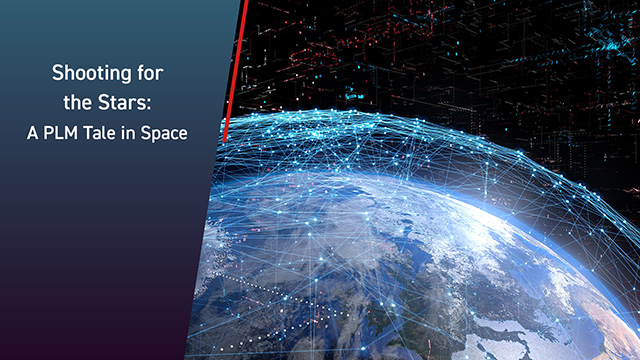Shooting for the Stars: A PLM Tale in Space
For the development of complex systems such as space systems, concurrent engineering processes are being increasingly used to integrate different engineering teams. These processes are supported by and dependent on computer systems that enable reliable data exchange and design review, verification, and validation processes. However, it is a major challenge, in practice, to obtain the right data, at the right time and from the right stakeholder.
ECSS (European Cooperation for Space Standardization) is a collaboration among European space agencies to provide a coherent set of standards for use in all space systems developments and operations in the European community. ECSS recognized the importance of adopting a standardized approach to data sharing and proposed some standards. As there are many different families of space systems, each with different data and IT requirements, it is unfeasible to establish a single, central data repository for a space project.
Therefore, ECSS recommends a data standardization approach at the semantic level, using a global conceptual data model containing all meaningful data from all system disciplines and whose scope encompasses the entire space system lifecycle. This would be the basis of a "Space Systems Data Repository", which is a collection of different databases logically integrated into an interoperable architecture that allows data to be effectively and reliably exchanged among them.
The Aras Innovator platform provides the flexibility to define custom data models and an open architecture to connect multiple software systems and data sources into a unified platform. In this webinar, Rodrigo Britto Maria, Aras presales engineer for EMEA, will demonstrate why Aras Innovator is the perfect fit to implement a data management solution compliant with the ECSS standards for the space industry.
Shooting for the Stars: A PLM Tale in Space

For the development of complex systems such as space systems, concurrent engineering processes are being increasingly used to integrate different engineering teams. These processes are supported by and dependent on computer systems that enable reliable data exchange and design review, verification, and validation processes. However, it is a major challenge, in practice, to obtain the right data, at the right time and from the right stakeholder.
ECSS (European Cooperation for Space Standardization) is a collaboration among European space agencies to provide a coherent set of standards for use in all space systems developments and operations in the European community. ECSS recognized the importance of adopting a standardized approach to data sharing and proposed some standards. As there are many different families of space systems, each with different data and IT requirements, it is unfeasible to establish a single, central data repository for a space project.
Therefore, ECSS recommends a data standardization approach at the semantic level, using a global conceptual data model containing all meaningful data from all system disciplines and whose scope encompasses the entire space system lifecycle. This would be the basis of a "Space Systems Data Repository", which is a collection of different databases logically integrated into an interoperable architecture that allows data to be effectively and reliably exchanged among them.
The Aras Innovator platform provides the flexibility to define custom data models and an open architecture to connect multiple software systems and data sources into a unified platform. In this webinar, Rodrigo Britto Maria, Aras presales engineer for EMEA, will demonstrate why Aras Innovator is the perfect fit to implement a data management solution compliant with the ECSS standards for the space industry.
